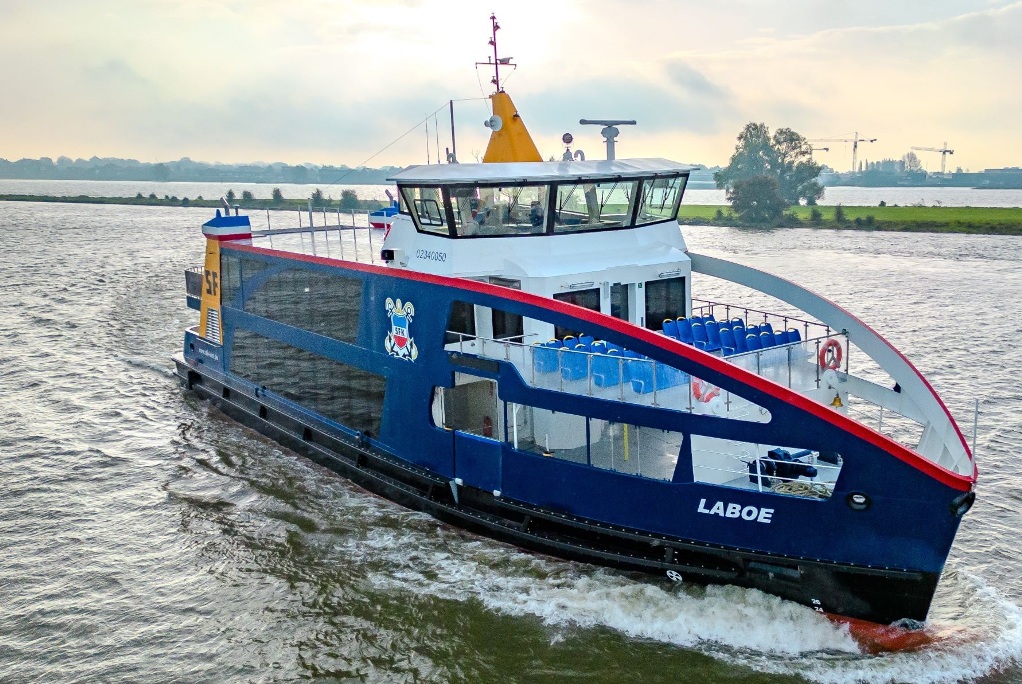EST-Floattech, a leading provider of maritime energy storage solutions, announces the successful delivery and commissioning of the Octopus Series battery system on the SFK Ferry Laboe. The ferry was recently successfully delivered to Schlepp- und Fährgesellschaft Kiel (SFK) by Holland Shipyards Group. It is the 6 th ferry in a series of 7 ferries with which SFK has the ambition to lower its CO2 emissions.
The Laboe is equipped with 560 kWh of the Octopus High Energy system. This battery system ensures the energy consumption remains low during the sailing, as the vessel can easily switch between generators and the battery system. The vessel can even sail fully emission-free around the city of Kiel, where it transports commuting pedestrians and cyclists from A to B. The system was integrated by Holland Ship Electric, who decided to collaborate with EST-Floattech on the ferries for SFK. EST-Floattech and Holland Ship Electric have a longstanding partnership with many successful collaborations, of which the Laboe is the latest project.
Reducing emissions with the Octopus Series
The city of Kiel in Germany is working hard to create an emission-free future. This collaboration reflects a shared vision for a cleaner, more efficient maritime industry, aligning with global efforts to reduce carbon emissions thanks to the Octopus Series battery system. The integrated energy management system optimizes the use of stored energy, enabling the ferry to operate more efficiently and reduce fuel consumption, leading to lower emissions and operational costs. This system has batteries with high energy density, ensuring optimal performance and long operational life for the SFK ferry Laboe.
Malte Klein from Schlepp- und Fährgesellschaft Kiel says: “When the new Octopus High Energy System was presented to us for the first time, we were impressed by the overhauled design and HMI features of the system. Simple integration into the ships networks and better connectivity to the PMS, moreover the new system comes with a higher safety standard. The performance of the system is more than satisfactory. The SFK is also informed that the system is capable to handle different kind of batteries types so it future proof.”
Rens Gerritsen, Project Manager from Holland Shipyards Group says: “The new Octopus High Energy EST battery system has been successfully integrated into both the hybrid ferry Laboe and the fully battery-powered ferry Dietrichsdorf. The inclusion of state-of-the-art battery racks and covers enhances the overall professional aesthetics of the system. Throughout the construction process, EST-Floattech maintained an open dialogue for feedback and suggestions from the shipyard and installer, resulting in a seamless integration of the battery pack into both vessels.”
John van de Sluis, director at Holland Ship Electric: “We have done many projects with EST-Floattech, and this was the first with their new Octopus Series energy storage solution, which has improved in many ways and was easily integrated into our power system. We look forward to many more successful collaborations in the future.”
Walter van der Pennen, Commercial Director at EST-Floattech says, “We are proud to be part of this transformative project that supports the goals of different parties involved in this project to create a more sustainable maritime industry and help lower the emissions in and around Kiel thanks to the Octopus Series battery system”.
Source: EST-Floattech.
Tags: Energy, EST-Floattech, Solutions, Storage



Recent Posts
Himachal Pradesh Plans Major Boost to Public Transport with E-Buses and Digital Upgrades
Ammonia-Fueled Container Feeder Design Marks Progress in Maritime Decarbonisation
ABS Develops Industry-Leading EV Battery Fire Simulation Modeling
Wilhelmsen Ships Service Joins the Maritime Battery Forum to Accelerate Maritime Electrification
Indian Student Team Wins Communication Prize at Monaco Energy Boat Challenge 2025
Babcock’s LGE Business Secures Contract for Marine Ammonia Fuel System to Advance Shipping Decarbonisation
Associated Terminals Deploys Liebherr’s All-Electric Cranes in Landmark Move Toward Cleaner Cargo Handling
Sanmar delivers fully electric emissions-free tug to major global operator Svitzer